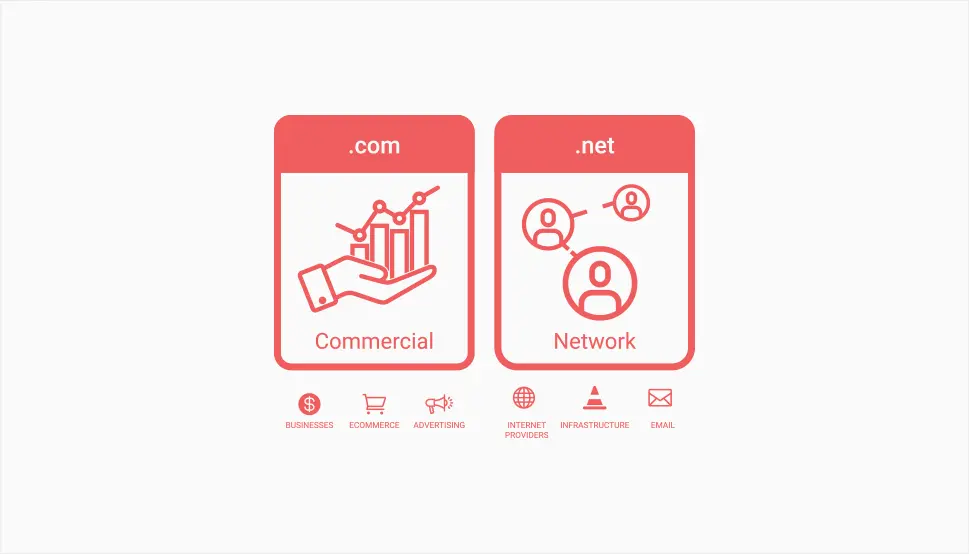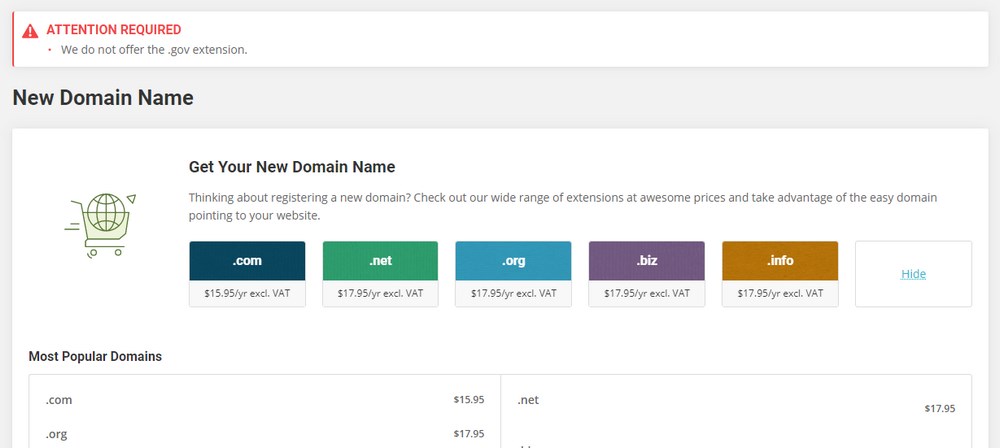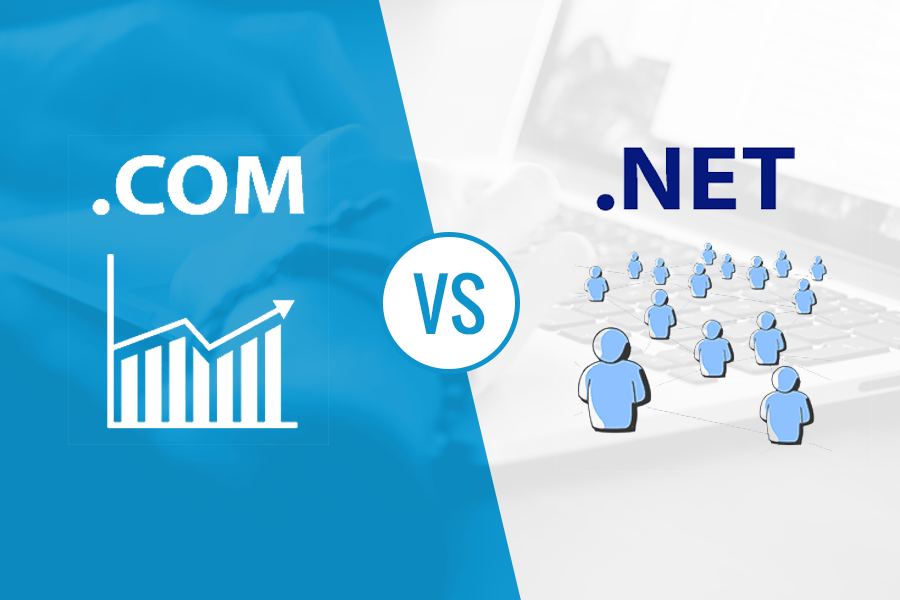When developing a website, you will be required to register a domain name in order to make it possible for people to locate your company and identify your brand on the internet. The extension is a component of the domain name, and depending on which one you choose, it might carry distinct meanings relating to the nature of your company or website. The .com prefix is reserved for commercial enterprises, whereas the .net extension is used exclusively for websites pertaining to networking technologies.
On the other hand, no restrictions are placed on who may use either extension, and internet businesses of all types use both of these extensions. New entrepreneurs sometimes find it difficult to choose between domain names. As .com and .net are the two most popular domain name extensions, we will decipher some key differences between .com and .net so you can decide between .net vs. .com.
What is a Domain Name?
A website has a specific address that is known as its domain name. In most cases, it includes both a website name and an extension for the domain name. Your audience will have an easier time finding your website and your brand will benefit from having a URL that is easy to remember. A domain name is like an address for your website; you need one in order to have one. Instead of using your website’s Internet Protocol (IP) address, it makes it easier for users to locate your site. There are three primary components that makeup domain names. These are the top-level domain, the second-level domain, and the third-level domain.
A top-level domain, also known as an extension or domain ending, is the suffix and the final element of a web address that comes to the right of the final dot after the principal domain name. It comes immediately after the primary domain name. Managing the distribution of top-level domains (TLDs) is the Internet Assigned Numbers Authority (IANA), which is now a department of ICANN (Internet Corporation for Assigned Names and Numbers).
The Internet Assigned Numbers Authority (IANA) has distributed seven top-level domains (TLDs) that were to operate as the primary generic top-level domains (gTLDs):
- .com refers to commercial firms and is the most prevalent Top-Level Domain (TLD).
- .org addresses often belong to non-profit organizations
- .gov: Government agencies
- .edu: Educational institutions
- .net: Network Technology Organizations
- .mil: Military Organizations
- .int: Intergovernmental Organization’s nonprofits
As you can see the above domain extensions are developed for different types of firms some extensions can be used in any type of firm such .com, .net, .org. However, there is some difference between them. Some of them are strong and some of them are less costly. So you may get in a dilemma to choose between them. Here is some comparison shown among them as .net vs. .com.
What is the difference between .com and .net?


When registering enterprises or websites of any kind, some of the most common extensions used are.com and.net. These two suffixes are particularly popular. Although the.com prefix is the most common and extensively used, you may also find success with the.net addition, particularly if your company is involved in the field of technology. Here are some key differences between .net vs. .com
Definitions
.Com – The suffix “.com” is an abbreviation for the word “commercial,” and it was first intended to be used by organizations and enterprises that operate for profit. It is now the domain name that has received the most acceptance from users all across the world.
.Net- The term “network” is abbreviated as “network,” and the dot-net extension was first implemented for usage with networking technology in the early days of the internet. As a result of the increased competition for.com names, many companies decided that.net was the next best extension to use in order to get the precise name they wanted to use for their company.
Both “.net” and “.com” are examples of domain extensions, which are added to the end of your primary domain name. The primary difference between them is the type of firm using it. For instance, the Facebook.com website uses the.com extension for its domain name. The.com extension has typically been used for commercial enterprises, but the.net extension was developed specifically for businesses that focus primarily on networking technology. However, any kind of business is free to use either of these extensions. If your company is in the technology industry, selecting a domain name with the.net extension rather than the more common.com extension may be the best option.
Pros and Cons- .net vs. .com
| Pros of .Net | Pros of .Com |
| The.net extension is available to be used by anyone. | .Com extension is suitable for use in any kind of company or organization due to its professionalism and adaptability. |
| It is an extension of a domain that is respected professionally and is well known. | It is a respectable domain extension that is well-known all around the world |
| It has reduced levels of competition while searching for your domain name | It can be obtained from any registrar for a price. |
| Cons of .Net | Cons of .Com |
| Even if it is less competitive than.com, there is still a relatively low number of available domain names to choose from. | If you buy a name from the secondary market, you will have to pay a higher price for it .com names |
| It’s possible that many individuals still hold the misconception that it isn’t as professional as the .com domain name. | Finding a desired name with a .com extension is difficult. |
| There are still certain tech-specific connotations, which may alter people’s impressions of what it is that you do. |
Now you know what is the difference between .com and .net, you to decide which domain extension is better for you.
FAQs


Is .com or .net better?
It is a common query of people that is .com or .net better. Well, the explanation is as in the following.
Due to the fact that they are a lot more widespread than the other options, .com domains are the greatest option for the majority of businesses and individuals who are trying to build a presence on the internet. Google gives a lower ranking to websites that have a domain ending in.net rather than.com. However, .net domains are becoming popular now as there is a chance to deal in a niche.
How much do .net and .com extensions cost?
Depending on where you choose to register the name, the costs to register a .com or a.net domain are going to be somewhat comparable, falling within a few dollar range at most. For any registration with either of these extensions, you can anticipate paying somewhere in the range of $10 to $15 every year as a fee. Although some registrars will charge more than others for.com and.net domain names, most registrars maintain very consistent pricing, and the additional costs that may be incurred are rather insignificant.
However, the prices differ when you compare .org vs .net vs .com. They also differ in terms of their usability.
Where can you get a domain name?
After choosing any domain name extensions such as .net or.com, buy your domain name. Registrars must register domain names with the central registry. Most registrars offer.com and.net domains, but not all. The three main domain-buying sites or registrars are
- Domain registrar: Some companies specialize in domain registration.
- Website builder: A website builder that lets you register a domain name, and develop and host your site. Most web builders also register domains during sign-up.
- Web hosting service: Web hosting providers are popular domain name providers. These service providers may register your domain for free in the first year.
Conclusion
Before buying a domain, keep in mind the distinctions between.com and.net.However, SEO is identical for.com and.net websites. Google and other search engines prioritize SEO over domain extension. Online businesses use the.com extension. Because of its popularity, finding an a.com domain extension may be harder. However, many technology professionals prefer.net domain extensions for organizations that offer technology and online services.





















Leave a Reply
View Comments